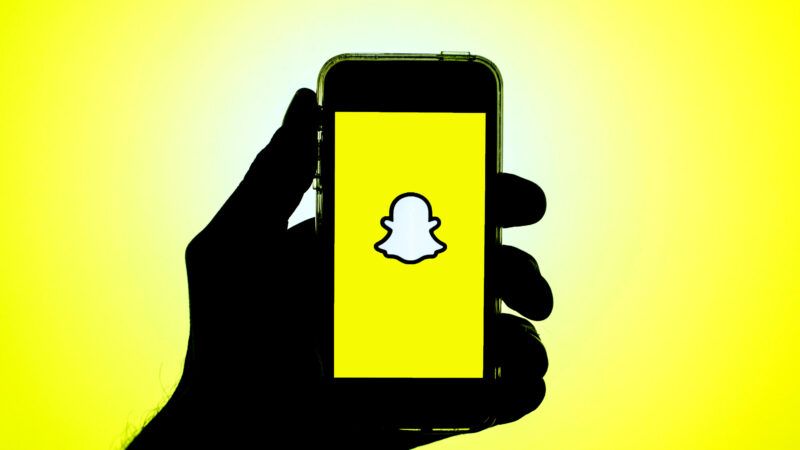Court Says Snapchat Can Be Sued for Deaths of Trio Using App During Fatal Crash
Plus: The challenges of free speech on Twitter, the case against baseball bailouts, and more...

Judges say Section 230 doesn't apply. It's a time-honored tradition for folks to blame new entertainment and communications mediums—rock music, rap music, video games, etc.—for the follies of the youth using them, and social media has been no exception. For years, parents, media, and authorities have been trying to hold popular apps accountable for a range of ills visited on young people using them.
For the most part, courts have rejected claims that the mere existence of these new mediums is responsible for people using them in ways that prove dangerous. In part, this is common sense; in part, it relies on Section 230, the federal communications law protecting digital services from some liability for the speech and action of their users. But now, a federal appeals court is taking a worrying step in the opposite direction.
On Tuesday, the U.S. Court of Appeals for the 9th Circuit ruled that the parents of three young people killed in a 2017 car crash could sue Snapchat because their kids had been using the app at the time of the crash.
The car carrying 17-year-olds Jason Davis and Hunter Morby and 20-year-old Landen Brown had hit a tree while going approximately 113 miles per hour, then burst into flames. Before the fatal accident, Brown had opened Snapchat and pulled up the app's speed filter, which shoots video while broadcasting how fast those using it are going.
Snapchat responded to their parents' lawsuit "by asserting that the company was protected by Section 230 because the Speed Filter is nothing more than a content creation tool within the platform that requires actual publishing to come from third-party users," notes Law & Crime:
In short, the company argued that holding it liable for creating the filter would in effect be making it liable for third-party content in violation of the law.
U.S. District Judge Michael Fitzgerald of the Central District of California agreed, dismissing the case in March by reasoning that it sought to treat the company "as the publisher or speaker" of "information provided by another information content provider."
But a three-judge panel on the U.S. Court of Appeals for the Ninth Circuit on Tuesday reversed Fitzgerald's decision, reasoning that the central issue in the case concerned Snapchat's product design, not whether it was responsible for content created and posted by users on the app.
According to the 9th Circuit's summary, "the duty that Snap, Inc. allegedly violated sprung from its distinct capacity as a product designer." The court called the crash one of the "predictable consequences of designing Snapchat in such a way that it allegedly encouraged dangerous behavior" and wrote that, as such, Snapchat does "not enjoy immunity from this suit under § 230."
The product design versus content creation debate has come up in Section 230 cases before, as plaintiffs attempt to overcome Section 230's protections. For instance, this was the tack in a 2019 case concerning harassment on Grindr, in which the person suing Grindr argued that it wasn't trying to hold Grindr responsible for harassing third-party content but for designing its product in such a way that allowed it. Another federal appeals court—the U.S. Court of Appeals for the 2nd Circuit—rejected this claim.
Why this is notable: For years, lawyers have argued that if the design of a website or app contributes to harm, the site shouldn't be shielded from a suit under Section 230. Judges scoffed at the argument over and over again.
But an appeals court has embraced it here. https://t.co/QZGEPs8KfE
— David McCabe (@dmccabe) May 4, 2021
FREE MINDS
Sarah McLaughlin of the Foundation for Individual Rights in Education talks to Techdirt about "Twitter, free speech, and the challenge mob behavior presents to online discourse":
FREE MARKETS
Against baseball bailouts. "Sen. Richard Blumenthal (D–Conn.) picked the perfect place to pitch a taxpayer-funded bailout for minor league baseball: A stadium that taxpayers already paid $66 million to build," writes Reason's Eric Boehm. Now Blumenthal wants more money for minor league baseball:
During a Monday press conference at Dunkin' Donuts Park in Hartford, Connecticut, Blumenthal said he would push for Congress to send $500 million to minor league clubs that are "on the verge of bankruptcy."
"Minor league baseball is in peril," Blumenthal said, according to the Hartford Courant.
"We need to come to their aide," he said. "We did it for restaurants, theater, live music. Baseball deserves it as much."
Blumenthal's not wrong about the financial problems that plague some minor league teams, but that's hardly a compelling reason for taxpayers to pick up the cost—especially when Blumenthal and others in Congress have opposed efforts by the baseball industry to address those issues privately.
QUICK HITS
https://twitter.com/oliviamesser/status/1389670611765665800?s=21
• Important SCOTUS case alert:
The U.S. Supreme Court heard arguments Tuesday in a case involving sentencing disparities between people found guilty of possessing crack cocaine and those possessing powdered forms, and whether recent changes in federal law should apply retroactively to those given long prison terms for small amounts of crack.
• President Joe Biden still "has not caught up with most Americans on marijuana policy."
• Donald Trump has a new website:
EXCLUSIVE: This is called a "website." He launched a website. pic.twitter.com/Tz9WMS5uyv
— Andrew Kirell ???????? (@AndrewKirell) May 4, 2021
https://twitter.com/mmasnick/status/1389740761856430080
• After heated debate yesterday, a Louisiana bill to decriminalize prostitution has been put on hold:
#HB67 has been deferred and will not be brought again to committee this #lalege session. All of our love and solidarity to @WWAVinc for leading the charge and every sex worker who showed up and spoke out. #deepsouthdecrim #sexworkisrealwork
— New Orleans DSA ???? (@NewOrleansDSA) May 4, 2021
• FiveThirtyEight explores how "new examinations and other data tell a nuanced story about the role of race in the 2020 contest."


Show Comments (389)